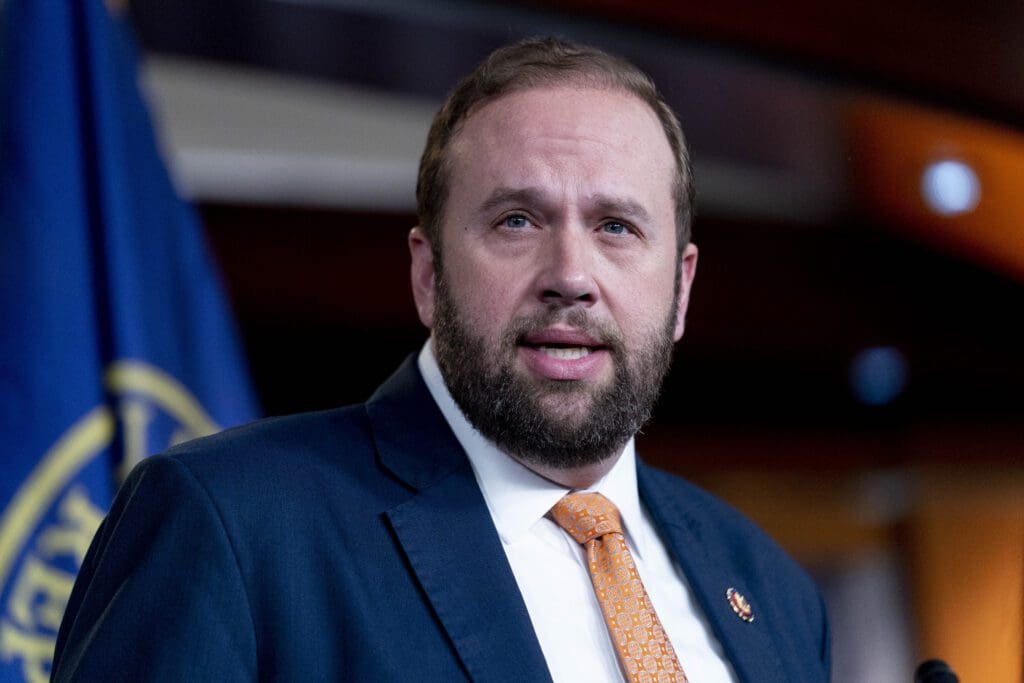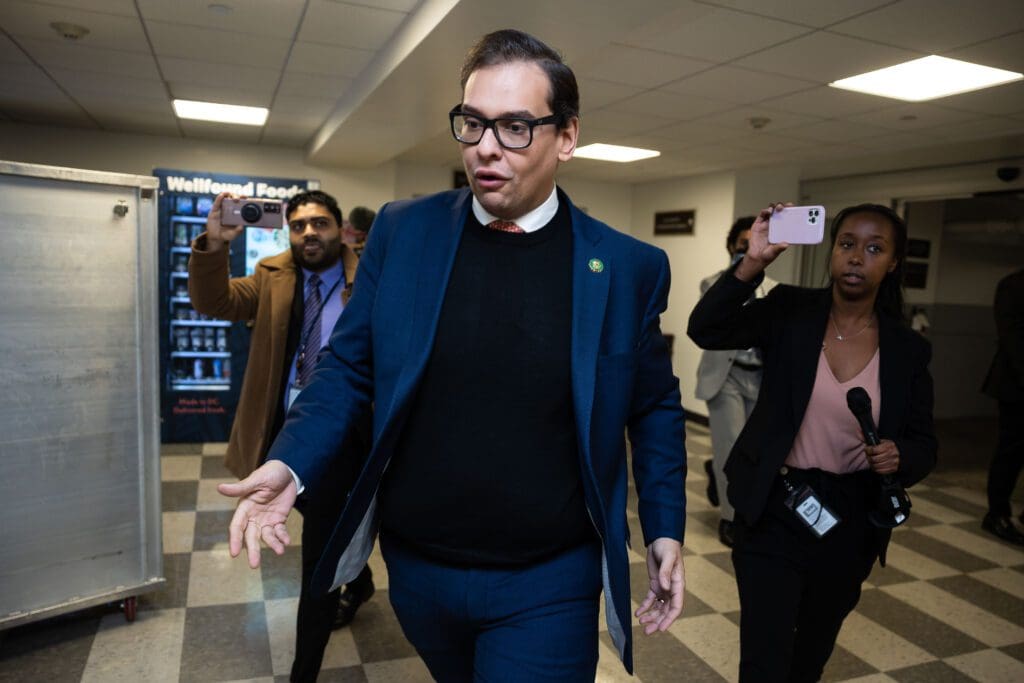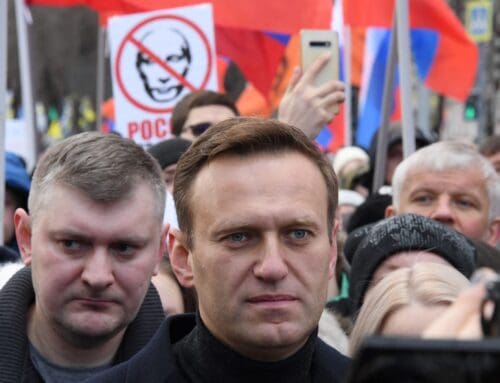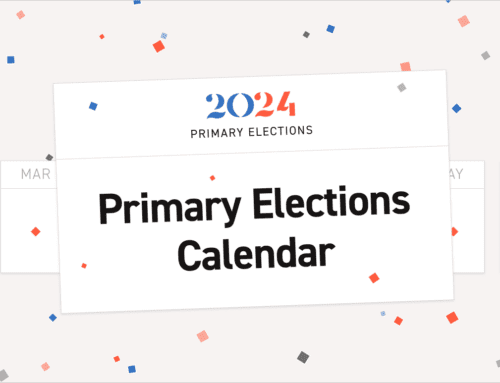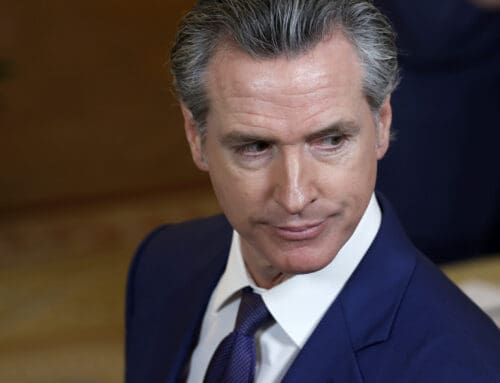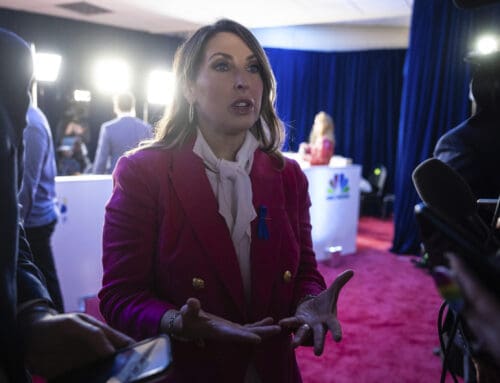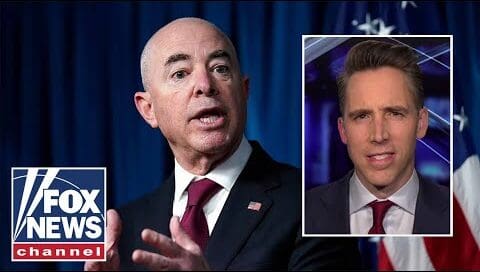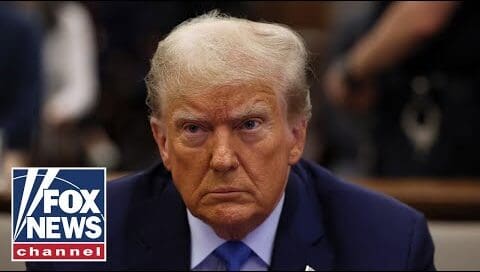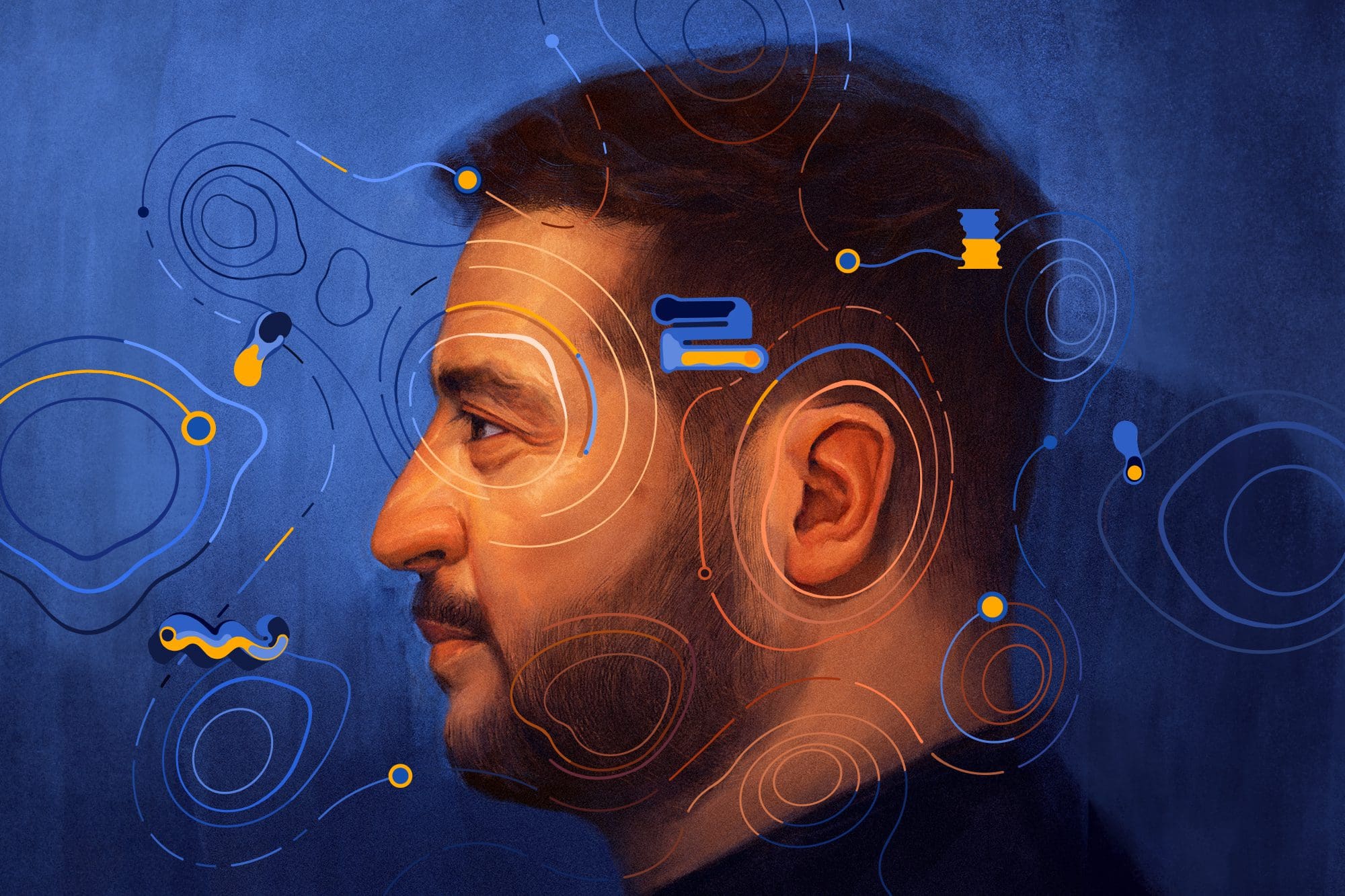

Why Volodymyr Zelenskyy Is a More Complex Leader Than Most People Know
Illustration by Sam Rodriguez for POLITICO
Jessica Pisano is an associate professor of politics at the New School for Social Research and an associate of the Davis Center for Russian and Eurasian Studies at Harvard University.
Everything the world has witnessed in Ukraine could have gone otherwise. Everyone who knows Ukrainians knew they would fight back when attacked. Yet the national unity that has prevailed under President Volodymyr Zelenskyy’s wartime leadership, which has prevented the Kremlin from swallowing Ukraine, was hardly a foregone conclusion.
It would be difficult to overestimate the centrifugal forces that pull at Kyiv today, a year on from Russia’s full-scale invasion. There are experiences people across Ukraine share, like the relentless wail of air raid sirens and the arrival of beloved bodies from the front. But even if there is no truly safe place in Ukraine, Ukrainians’ experience of war differs from one place to another. Some cities weather daily missile and mortar attacks, while others receive internally displaced people and a few, like Kharkiv, do both. In other areas, life continues with relatively fewer interruptions. Disparities in electricity provision, economic and housing insecurity, experiences of occupation, and incidence of death and injury — all are playing out against a backdrop of societal stress, including family separation, massive job loss and the steep decline in living standards that followed the onset of war across Ukraine’s territory.
There’s little doubt that shared anger at Russian President Vladimir Putin — the one who made Ukraine go to war, the one who has disrupted the lives and dreams of every Ukrainian — and at Russian society for its participation in a genocidal war, has contributed to uniting the country. But rally-round-the-flag effects only carry so far. With a national leader of less depth than Zelenskyy, the problems Russia has created could have pulled Ukraine apart — and the Kremlin is hoping they still will.
Zelenskyy, a former actor and movie producer and head of a comedy troupe, is an exceptionally skillful communicator who has won over skeptics abroad and at home. But that’s not all he is: in the face of epochal challenges, Zelenskyy’s communication skills alone might not have been enough to hold his country together.
Zelenskyy’s leadership has another dimension not widely appreciated outside parts of Ukraine where many people speak Russian in everyday life. In the years after Russia’s 2014 annexation of Crimea and provocation of war in the Donbas, Zelenskyy, working with other comedians, laid conceptual groundwork for a capacious form of patriotism focusing on love for Ukraine, rather than ethnic identity or mother tongue. If he and they had not, the country might not have unified the way it has.
Zelenskyy became a household name across the globe in 2022, but many Ukrainians had known him for decades. Millions of Russian-speaking Ukrainians had watched Zelenskyy and his comedy troupe Kvartal-95 on television for years before Russians had even heard the name Vladimir Putin. As players in international improvisational comedy competitions, their skits were broadcast on Russian state television, drawing millions of viewers across countries previously colonized by the Soviet Union. Zelenskyy’s future wife, Olena Zelenska, a serious comedy writer with a nuanced touch, wrote many of those skits.
Then, in 2003, rejecting overtures from Moscow to remain loyal to his troupe members, Zelenskyy created his own production company and launched the popular Saturday evening revue Evening Kvartal, where he and his troupe performed searing sketch comedy interspersed with song-and-dance routines with a political edge that would remind Americans of the best years of “Saturday Night Live.” The show was a smash hit. Before Zelenskyy left the stage to serve as president of Ukraine, nearly one in five Ukrainian television watchers tuned in to Evening Kvartal. The show was particularly popular in parts of Ukraine where people tended to speak Russian at home. Zelenskyy’s other work was equally popular: During the year before Russia’s full-scale invasion, a sitcom produced by the company was the most popular show on both Ukrainian and Russian television.
If Soviet rule was distinguished above all by its ruthlessness or pitilessness, and the profound economic crisis of the 1990s by mercilessness of a different sort, in the years following Russia’s 2014 invasion, Zelenskyy and his comedy troupe depicted a different way to be a member of Ukrainian society. Their entertainment told the truth about politics and everyday life even when the stakes of doing so were high, but they also consistently embodied and articulated humanistic values. As stage performers watched by millions, Zelenskyy and his troupe promoted an inclusive pro-Ukrainian vision that elevated local identities, embraced all Ukrainians regardless of what language they spoke at home, and leaned into agonism: a politics where democracy is about argument and struggle, not agreement.
This was a vision that was at odds with both Ukrainian ethno-nationalism and Moscow’s imperial ambitions.
Because of Zelenskyy’s acting background, contemporary commentators understandably focus on how he performs as president: his stellar execution of both scripted and seemingly unscripted political communication and his use of dramaturgy to connect with audiences in a way that makes them feel drawn into the story.
But accounts of how Zelenskyy leads often ignore the why, imagining his everyman persona and political philosophy as a brand of liberal populism focused mainly on anti-corruption rhetoric. Yet long before he starred in a television show in which he portrayed a Ukrainian president, what Zelenskyy projected from the stage and from the TV screen was the idea of a unified and genuinely free Ukraine.
Zelenskyy has the overwhelming support of his country now not because all his policies are popular (they’re not), but because of his personal character, because he refused to leave when under attack, because he has put his country first in the service of Ukrainian nationhood.
Ukrainians elected Zelenskyy president in a landslide partially because they were fed up with politics as usual, but also because he articulated positive, human values and a vision of Ukrainian nationhood that validated people’s local identities. And it’s why he now has a following — not a cult.
When Ukraine became independent in 1991 amid the dissolution of the Soviet Union, it was a country in search of a national idea. This wasn’t straightforward: The ancestors of Ukraine’s citizens played different roles in a national history that included both great achievements and bloodshed. People searched for something beyond a belief in their constitution that could bring them together across differences in politics and life experience.
Ukrainians have long struggled with forces that threatened to divide their society. Under Soviet rule, Moscow’s policies of Russification in Ukraine had contributed to a situation that made independent Ukraine seem divided along the Dnipro River, with Ukrainian speakers on one side and Russian speakers on the other. Today, the fact that many Ukrainians still speak Russian in everyday life is in many ways a legacy of those Soviet-era policies — including the death by starvation of millions of Ukrainians because of grain confiscation, and the summary executions of hundreds of Ukrainian artists, writers and intellectuals — not an expression of brotherhood with Russia, no matter what the Kremlin might say.
But Ukraine has never been such a binary place. Ukrainians have a long multicultural history that includes not only ethnic Ukrainians but also people who identify as Jewish (including Zelenskyy), Bulgarian, Crimean Tatar, Hungarian, Greek, Korean, Polish, Romani, Romanian, Russian and others, whose languages are still spoken in Ukraine today. In his 2020 presidential New Year’s greeting, Zelenskyy acknowledged the nature of Ukraine’s diversity by speaking not only in Ukrainian, but also in Hungarian, Crimean Tatar and Russian.
In 2014, when Russia annexed Crimea and invaded Ukraine’s Donbas region under a thinly veiled pretext of supporting Russian-speaking separatists, Ukrainians largely united against these violations of their country’s territory. At that time, Zelenskyy’s comedy troupe voiced in metaphor Ukrainians’ frustration at Russia’s incessant lies and refusal to let them go and their pain at the tepid response of the international community, singing of “European ‘brothers’ who traded us for gas.”
During those years, the stress of the Russian occupation of Crimea and Donbas threatened Ukrainians’ unity. Some noticed an opportunity to win national elections if parts of the Russified east were no longer part of Ukraine, murmuring in private about being ready to “let the Donbas go.” But even then, still working as a comedian, Zelenskyy was not ready to abandon his compatriots in Russia-occupied areas. In their comedy skits, Zelenskyy and his troupe amplified their longstanding criticisms of Russian chauvinism, turning the tables to pantomime and mock Russians’ longstanding ethnic slurs, lies about Ukrainians and attitudes about Crimea.
At that time, Zelenskyy and his comedy troupe performed mainly in the Russian language, reaching Ukrainians who used Russian in daily life and came from regions where people sometimes felt alienated from politics in the capital, and who previously had sometimes struggled to see themselves as sharing common experiences and identities with their compatriots who spoke the state language at home and in daily life. By making Ukrainians from different regions feel seen and valued, Zelenskyy invited them into a patriotism that held up love of Ukraine as a central value but did not insist on a particular ethnic or private linguistic identity. He and his troupe showed how Russian-speaking Ukrainians, who did not think of themselves as nationalists, could identify as Ukrainian patriots.
As a comedian, Zelenskyy and his troupe used an approach to thinking about Ukraine’s past that differed from the us-versus-them thinking that long dominated some public discussion about politics in Ukraine. Performing songs that reminded Ukrainians of shared experiences, he and his troupe not only validated local identities, but admitted mistakes and imperfections, acknowledged disagreement, and fostered a generous, inclusive idea of what it meant to be Ukrainian.
Instead of trying to resolve Ukrainians’ deep differences over policy, Zelenskyy and his troupe focused on encouraging patriotism and on offering their audiences a positive vision of a shared future. Gently provoking audiences to ask themselves questions about who they wanted to be as a nation, they enjoined their audiences to unify in defiance of Russian aggression and sang with love of all of Ukraine’s internationally-recognized territory, including Crimea and the Donbas — affirming that Ukraine, notwithstanding the Kremlin’s insistence otherwise, is a real country: “Type Ukraine in Google. Find Ukraine on the map.” Anticipating the price of preserving their freedom and independence, they nonetheless concluded, “It’s better for us to burn here than to suffocate” under Russian rule.
Zelenskyy’s validation of local identities mirrored efforts in Ukraine’s government after 2014 to devolve political power out of Kyiv: Decentralization empowered local communities to make decisions previously dominated by regional and national authorities and enhanced the ability of individual towns and cities to band together for civic defense. At the same time, Zelenskyy and his troupe were celebrating Ukraine as a complicated, sometimes contradictory country that was strong because of its variation, not despite it. They performed musical numbers that recognized and appreciated regional dialects and the particularities of individual cities, while Zelenskyy’s troupe member Olena Kravets led a spinoff revue with a predominantly female, diverse team embodying many different Ukrainian identities who joked and sang about experiences women shared, regardless of ethnicity. Zelenskyy and his troupe offered a buoyant vision of what it meant to be Ukrainian that included everyone from L’viv to the Donbas.
In spring 2014 on the heels of Russia’s annexation of Crimea, one musical number opened by expressing the ambivalence many Ukrainians had felt before Russia’s invasion — “I sort of love my country.” Then the song evolved, just as Ukrainians’ feelings were evolving, and ended with a transformed idea, “I love my country like crazy,” despite its messiness. The song ended with the idea that “Maybe it would be worth it to put our conflicts aside and live calmly in peace.”
Since he became president, it has mattered that Zelenskyy wasn’t just an actor but specifically, that he is a comedian.
Zelenskyy has rocketed to global fame as a master communicator and courageous wartime leader who still invites complicity by cracking a joke, as in his tongue-in-cheek call to Russians to sabotage their own forces or a thought-but-not-spoken joke about the Russian president.
Zelenskyy’s brand of comedic satire and its profoundly democratic orientation offered a stark contrast with both longstanding Russian traditions of parody and the cagey humor of the far right, which relies on irony and cynicism. As it happens, the Kremlin puppet-master once responsible for Ukraine policy, Vladislav Surkov, was also trained in dramatic theater and has used the tools of that trade in politics. But he and others in the Russian president’s entourage prefer postmodern stagecraft: For them, truth is only another name for the object of their irony.
Illiberal populists who follow their followers use comedy to make it hard for people to know where they stand because they hide behind ambiguity — “It was only a joke!” By contrast, Zelenskyy’s authenticity and sincerity made crystal clear for his audiences where he stood and what he meant. His approach reflected Ukrainian peoples’ long literary and cultural traditions of laughing in the face of hardship.
Zelenskyy’s colleagues on the stage, who now perform in the Ukrainian language, are continuing this work to this day, producing morale-raising musical revues and comedy shows shared on social media. The comedian who replaced Zelenskyy on the stage, Yuriy Velykyy, performs parodies that celebrate Ukrainian voluntarism while mocking narcissistic, mind-bogglingly evasive and just plain sad Russian memes and media. With comedian Anastasiia Orudzhova, Velykyy uses satire to tell the truth about the war. With millions of Ukrainians displaced abroad and at home, this internet-based comedy helps keep alive a spirit of unity, as shared understanding of humor draws the boundaries of the nation.
Some Ukrainians have wondered publicly about what will happen after victory, when a common enemy no longer galvanizes societal unity. Yet the vision of politics Zelenskyy promoted for decades from the stage is now present throughout Ukrainian society, and Ukrainians in the south and east of the country who once might have felt sympathy for Russia and have borne the brunt of its violence have now turned irrevocably toward Kyiv. Since Russia’s invasion one year ago, Ukrainians’ shared experience of war has forged a nation whose social fabric, woven of many different threads, has proven far more flexible and resilient, and more resistant to damage, than an undifferentiated weft.
Through it all, Zelenskyy has been consistent in the courage of his convictions. A full 20 years before Russia’s president would launch a war of imperial expansion aimed at annihilating Russian-speaking Ukrainians for their refusal of Moscow’s embrace, Zelenskyy and his improv team from their hardscrabble, Russophone industrial hometown in southeastern Ukraine stood on the stage of the Russian Army Theater in Moscow for an improv contest. Addressing a panel of contest judges and a television audience that spanned the Russian-speaking world, Zelenskyy and his troupe proclaimed their identity with what would become Zelenskyy’s trademark — speaking truth to power, wrapping it in pointed humor. “Here you are, Russia. Here we are, Ukraine,” they told that audience in Moscow. “It’s time to speak frankly. … What do we have in common, other than a border?”

